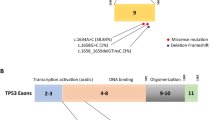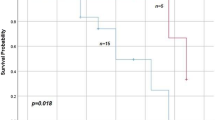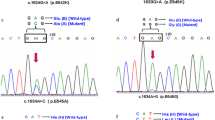Abstract
Purpose
Though p53, BRCA1, ATM, PIK3CA, and HER2 genes are shown to be involved in various aspects of breast carcinogenesis, their functional relationship and clinical value are still disputable. We investigated the genetic status or expression profile of these genes to further elucidate their clinical significance.
Methods
PCR-SSCP-Sequencing of p53, BRCA1, ATM, and PIK3CA was performed in 145 Bulgarian patients with sporadic breast cancer. Expression profiles of HER2 were determined by ICH and CISH. Relationship between mutations and clinicopathological characteristics was evaluated by Chi-squared and Fisher’s exact tests. Multivariate Cox proportional hazard test and Kaplan–Meier analysis were used to evaluate differences in overall survival between groups.
Results
The frequency of p53 (22.07%), BRCA1 (0.69%), ATM (7.59%), and PIK3CA (31.25%) alterations and HER2 (21.21%) overexpression was estimated. Mutated p53 was associated with tumor size (P = 0.033) and grade of malignancy (P = 0.001), ATM—with grade of malignancy (P = 0.032), and PIK3CA—with PR-positive tumors (P = 0.047). HER2 overexpression correlated with age of diagnosis (P = 0.009), tumor size (P = 0.0004), and ER expression (P = 0.011). Univariate survival analysis showed that mutated p53 is an indicator for worse outcome (P = 0.041). Combination of two genetic abnormalities did not correlate with more aggressive carcinogenesis and worse overall survival.
Conclusions
Our data indicated that p53, BRCA1, ATM, PIK3CA, and HER2 alterations specifically correlate with clinicopathological characteristics of Bulgarian patients with breast cancer. Of these genes, only mutated p53 showed significant, though not independent, negative effect on overall survival.

Similar content being viewed by others
Abbreviations
- BC:
-
Breast cancer
- IHC:
-
Immunohistochemical analysis
- CISH:
-
Chromogenic in situ Hybridization
- OS:
-
Overall survival
- T:
-
Tumor size
- N:
-
Nodal status
- G:
-
Grade of malignancy
- ER:
-
Estrogen receptor
- PR:
-
Progesterone receptor
- HR:
-
Hazard ratio
- CI:
-
Confidence interval
References
Bachman KE, Argani P, Samuels Y, Silliman N, Ptak J, Szabo S, Konishi H, Karakas B, Blair BG, Lin C, Peters BA, Velculescu VE, Park BH (2004) The PIK3CA gene is mutated with high frequency in human breast cancers. Cancer Biol Ther 3:772–775
Bader AG, Kang S, Vogt PK (2006) Cancer-specific mutations in PIK3CA are oncogenic in vivo. Proc Natl Acad Sci USA 103:1475–1479. doi:10.1073/pnas.0510857103
Barbareschi M, Buttitta F, Felicioni L, Cotrupi S, Barassi F, Del Grammastro M, Ferro A, Dalla Palma P, Galligioni E, Marchetti A (2007) Different prognostic roles of mutations in the helical and kinase domains of the PIK3CA gene in breast carcinomas. Clin Cancer Res 13:6064–6069. doi:10.1158/1078-0432.CCR-07-0266
Bartkova J, Horvejsv Z, Koed K, Kramer A, Tort F, Zieger K, Guldberg P, Sehested M, Nesland MJ, Lukas C, Orntoft T, Lukas J, Bartek J (2005) DNA damage response as a candidate anti-cancer barrier in early human tumorigenesis. Nature 434:864–870
Borresen-Dale AL (2003) TP53 and breast cancer. Hum Mutat 21:292–300. doi:10.1002/humu.10174
Bull SB, Ozcelik H, Pinnaduwage D, Blackstein ME, Sutherland DA, Pritchard KI, Tzontcheva AT, Sidlofsky S, Hanna WM, Qizilbash AH, Tweeddale ME, Fine S, McCready DR, Andrulis IL (2004) The combination of p53 mutation and neu/erbB-2 amplification is associated with poor survival in node-negative breast cancer. J Clin Oncol 22:86–96. doi:10.1200/JCO.2004.09.128
Buzin CH, Tang SH, Cunningham JM, Shibata A, Ross RK, Hartmann A, Blaszyk H, Kovach JS (2001) Low frequency of p53 gene mutations in breast cancers of Japanese-American women. Nutr Cancer 39:72–77
Campbell IG, Russell SE, Choong DY, Montgomery KG, Ciavarella ML, Hooi CS, Cristiano BE, Pearson RB, Phillips WA (2004) Mutation of the PIK3CA gene in ovarian and breast cancer. Cancer Res 64:7678–7681
Carr JA, Havstad S, Zarbo RJ, Divine G, Mackowiak P, Velanovich V (2000) The association of HER-2/neu amplification with breast cancer recurrence. Arch Surg 135:1469–1474
Danon Sh, Valerianova Zdr, Ivanova Tzv (2006) Bulgarian National Cancer Registry. Cancer incidence in Bulgaria 2003. Bulgarian Publishing House, Sofia
Dork T, Bendix R, Bremer M, Rades D, Klopper K, Nicke M, Skawran B, Hector A, Yamini P, Steinmann D, Weise S, Stuhrmann M, Karstens JH (2001) Spectrum of ATM gene mutations in a hospital-based series of unselected breast cancer patients. Cancer Res 61:7608–7615
Easton DF (1994) Cancer risks in A–T heterozygotes. Int J Radiat Biol 66:177–182
Elledge RM, Fuqua SAW, Clark GM, Pujol P, Allred DC, Mcguire WL (1993) Prognostic significance of p53 gene alterations in nodenegative breast cancer. Breast Cancer Res Treat 26:225–235
Esteller M, Silva JM, Dominguez G, Bonilla F, Matias-Guiu X, Lerma E, Bussaglia E, Prat J, Harkes IC, Repasky EA, Gabrielson E, Schutte M, Baylin SB, Herman JG (2000) Promoter hypermethylation and BRCA1 inactivation in sporadic breast and ovarian tumors. J Natl Cancer Inst 92(Suppl 7):564–569
Ford D, Easton DF, Stratton M, Narod S, Goldgar D, Devilee P, Bishop DT, Weber B, Lenoir G, Chang-Claude J, Sobol H, Teare MD, Struewing J, Arason A, Scherneck S, Peto J, Rebbeck TR, Tonin P, Neuhausen S, Barkardottir R, Eyfjord J, Lynch H, Ponder BAJ, Gayther SA, Birch JM, Lindblom A, Stoppa-Lyonnet D, Bignon Y, Borg A, Hamann U et al (1998) Genetic heterogeneity and penetrance analysis of the BRCA1 and BRCA2 genes in breast cancer families. Am J Hum Genet 62:676–689
Friedman LS, Ostermeyer EA, Szabo CI, Dowd P, Lynch ED, Rowell SE, King MC (1994) Confirmation of BRCA1 by analysis of germline mutations linked to breast and ovarian cancer in ten families. Nat Genet 8:399–404
Gatti RA, Tward A, Concannon P (1999) Cancer risk in ATM heterozygotes: a model of phenotypic and mechanistic differences between missense and truncating mutations. Mol Genet Metab 68:419–423. doi:10.1006/mgme.1999.2942
Georgieva M, Krasteva M, Angelova E, Ralchev K, Dimitrov V, Bozhimirov S, Georgieva E, Berger MR (2008) Analysis of the K-ras/B-raf/Erk signal cascade, p53 and CMAP as markers for tumor progression in colorectal cancer patients. Oncol Rep 20(Suppl 1):3–11
González-Hormazábal P, Bravo T, Blanco R, Valenzuela YC, Gómez F, Waugh E, Peralta O, Ortuzar W, Reyes JM, Jara L (2008) Association of common ATM variants with familial breast cancer in a South American population. BMC Cancer 8:117. doi:10.1186/1471-2407-8-117
Heikkinen K, Rapakko K, Karppinen SM, Erkko H, Nieminen P, Winqvist R (2005) Association of common ATM polymorphism with bilateral breast cancer. Int J Cancer 116:69–72. doi:10.1002/ijc.20996
Ikenoue T, Kanai F, Hikiba Y, Obata T, Tanaka Y, Imamura J, Ohta M, Jazag A, Guleng B, Tateishi K, Asaoka Y, Matsumura M, Kawabe T, Omata M (2005) Functional analysis of PIK3CA gene mutations in human colorectal cancer. Cancer Res 65:4562–4567
Izatt L, Greenman J, Hodgson S, Ellis D, Watts S, Scott G, Jacobs C, Liebmann R, Zvelebil MJ, Mathew C, Solomon E (2000) Identification of germline missense mutations and rare allelic variants in the ATM gene in early-onset breast cancer. Genes Chromosomes Cancer 26:286–294
Khanna KK, Chenevix-Trench G (2004) ATM and genome maintenance: defining its role in breast cancer susceptibility. J Mammary Gland Biol Neoplasia 9:247–262. doi:10.1023/B:JOMG.0000048772.92326.a1
Khanna KK, Lavin MF, Jackson SP, Mulhern TD (2001) ATM, a central controller of cellular responses to DNA damage. Cell Death Differ 8:1052–1065
Krasteva ME, Georgieva EI (2006) Germline p53 single-base changes associated with Balkan endemic nephropathy. Biochem Biophys Res Commun 342:562–567. doi:10.1016/j.bbrc.2006.02.004
Krasteva ME, Garanina Z, Georgieva EI (2003) Optimized polymerase chain reaction-based single-strand conformation polymorphism analysis of p53 gene applied to Bulgarian patients with invasive breast cancer. Clin Exp Med 3:173–180. doi:10.1007/s10238-003-0022-z
Lacroix M, Toillon RA, Leclercq G (2006) p53 and breast cancer, an update. Endocr Relat Cancer 13:293–325. doi:10.1677/erc.1.01172
Langerød A, Zhao H, Borgan Ø, Nesland JM, Bukholm IR, Ikdahl T, Kåresen R, Børresen-Dale AL, Jeffrey SS (2007) TP53 mutation status and gene expression profiles are powerful prognostic markers of breast cancer. Breast Cancer Res 9(Suppl 3):30. doi:10.1186/bcr1675
Li SY, Rong M, Grieu F, Iacopetta B (2006) PIK3CA mutations in breast cancer are associated with poor outcome. Breast Cancer Res Treat 96:91–95. doi:10.1007/s10549-005-9048-0
Liedtke C, Cardone L, Tordai A, Yan K, Gomez HL, Figureoa LB, Hubbard RE, Valero V, Souchon EA, Symmans WF, Hortobagyi GN, Bardelli A, Pusztai L (2008) PIK3CA-activating mutations and chemotherapy sensitivity in stage II–III breast cancer. Breast Cancer Res 10(Suppl 2):27. doi:10.1186/bcr1984
Maillet P, Chappuis PO, Vaudan G, Dobbie Z, Muller H, Hutter P, Sappino AP (2000) A polymorphism in the ATM gene modulates the penetrance of hereditary non-polyposis colorectal cancer. Int J Cancer 88:928–931. doi:10.1002/1097-0215(20001215)88:6<928:AID-IJC14>3.0.CO;2-P
Markoff A, Sormbroen H, Bogdanova N, Preisler-Adams S, Ganev V, Dworniczak B, Horst J (1998) Comparison of conformation-sensitive gel electrophoresis and single-strand conformation polymorphism analysis for detection of mutations in the BRCA1 gene using optimized conformation analysis protocols. Eur J Hum Genet 6:145–150
Maruyama N, Miyoshi Y, Taguchi T, Tamaki Y, Monden M, Noguchi S (2007) Clinicopathologic analysis of breast cancers with PIK3CA mutations in Japanese women. Clin Cancer Res 15:408–414
Olivier M, Langerod A, Carrieri P, Bergh J, Klaar S, Eyfjord J, Theillet C, Rodriguez C, Lidereau R, Bieche I, Varley J, Bignon Y, Uhrhammer N, Winqvist R, Jukkola-Vuorinen A, Niederacher D, Kato S, Ishioka C, Hainaut P, Borresen-Dale AL (2006) The clinical value of somatic TP53 gene mutations in 1,794 patients with breast cancer. Clin Cancer Res 12:1157–1167. doi:10.1158/1078-0432.CCR-05-1029
Petitjean A, Achatz MI, Borresen-Dale AL, Hainaut P, Olivier M (2007) TP53 mutations in human cancers: functional selection and impact on cancer prognosis and outcomes. Oncogene 26:2157–2165. doi:10.1038/sj.onc.1210302
Rahko E, Blanco G, Soini Y, Bloigu R, Jukkola A (2003) A mutant TP53 gene status is associated with a poor prognosis and anthracycline-resistance in breast cancer patients. Eur J Cancer 39:447–453
Rosen PP, Lesser ML, Arroyo CD, Cranor M, Borgen P, Norton L (1995) p53 in node-negative breast carcinoma: an immunohistochemical study of epidemiologic risk factors, histologic features, and prognosis. J Clin Oncol 13:821–830
Ross JS, Fletcher JA, Linette GP, Stec J, Clark E, Ayers M, Symmans WF, Pusztai L, Bloom KJ (2003) The Her-2/neu gene and protein in breast cancer: biomarker and target of therapy. Oncologist 8:307–325
Rudolph P, Olsson H, Bonatz G, Ratjen V, Bolte H, Baldetorp B, Fernö M, Parwaresch R, Alm P (1999) Correlation between p53, c-erbB-2, and topoisomerase II alpha expression, DNA ploidy, hormonal receptor status and proliferation in 356 node-negative breast carcinomas: prognostic implications. J Pathol 187:207–216. doi:10.1002/(SICI)1096-9896(199901)187:2<207:AID-PATH223>3.0.CO;2-U
Saal LH, Holm K, Maurer M, Memeo L, Su T, Wang X, Yu JS, Malmstrom PO, Mansukhani M, Enoksson J, Hibshoosh H, Borg A, Parsons R (2005) PIK3CA mutations correlate with hormone receptors, node metastasis, and ERBB2, and are mutually exclusive with PTEN loss in human breast carcinoma. Cancer Res 65:2554–2559
Samuels Y, Wang Z, Bardelli A, Silliman N, Ptak J, Szabo S, Yan H, Gazdar A, Powell SM, Riggins GJ, Willson JK, Markowitz S, Kinzler KW, Vogelstein B, Velculescu VE (2004) High frequency of mutations of the PIK3CA gene in human cancers. Science 304:554. doi:10.1126/science.1096502
Samuels Y, Diaz LA Jr, Schmidt-Kittler O, Cummins JM, Delong L, Cheong I, Rago C, Huso DL, Lengauer C, Kinzler KW, Vogelstein B, Velculescu VE (2005) Mutant PIK3CA promotes cell growth and invasion of human cancer cells. Cancer Cell 7:561–573
Sansal I, Sellers WR (2004) The biology, clinical relevance of the PTEN tumor suppressor pathway. J Clin Oncol 22:2954–2963. doi:10.1200/JCO.2004.02.141
Sawaki M, Ito Y, Akiyama F, Tokudome N, Horii R, Mizunuma N, Takahashi S, Horikoshi N, Imai T, Nakao A, Kasumi F, Sakamoto G, Hatake K (2006) High prevalence of HER-2/neu and p53 overexpression in inflammatory breast cancer. Breast Cancer 13:172–178. doi:10.2325/jbcs.13.172
Singh B, Reddy PG, Goberdhan A, Walsh C, Dao S, Ngai I, Chou TC, O-charoenrat P, Levine AJ, Rao PH, Stoffel A (2002) p53 regulates cell survival by inhibiting PIK3CA in squamous cell carcinomas. Genes Dev 16:984–993. doi:10.1101/gad.973602
Slamon DJ, Clark GM, Wong SG, Levin WJ, Ullrich A, McGuire WL (1987) Human breast cancer: correlation of relapse and survival with amplification of the HER-2/neu oncogene. Science 235:177–182
Swift M, Morrell D, Massey RB, Chase CL (1991) Incidence of cancer in 161 families affected by ataxiatelangiectasia. N Engl J Med 325:1831–1836
Thompson D, Duedal S, Kirner J, McGuffog L, Last J, Reiman A, Byrd P, Taylor M, Easton DF (2005) Cancer risks and mortality in heterozygous ATM mutation carriers. J Natl Cancer Inst 97:813–822. doi:10.1093/jnci/dji141
Tommiska J, Jansen L, Kilpivaara O, Edvardsen H, Kristensen V, Tamminen A, Aittomaki K, Blomqvist C, Borresen-Dale AL, Nevanlinna H (2006) ATM variants and cancer risk in breast cancer patients from Southern Finland. BMC Cancer 6:209. doi:10.1186/1471-2407-6-209
Tuma RS (2005) Trastuzumab trials steal show at ASCO meeting. J Natl Cancer Inst 97:870–871. doi:10.1093/jnci/97.12.870
Vogt PK, Kang S, Elsliger MA, Gymnopoulos M (2007) Cancer-specific mutations in phosphatidylinositol 3-kinase. Trends Biochem Sci 32:342–349. doi:10.1016/j.tibs.2007.05.005
Whyte DB, Holbeck SL (2006) Correlation of PIK3CA mutations with gene expression and drug sensitivity in NCI-60 cell lines. Biochem Biophys Res Commun 340:469–475. doi:10.1016/j.bbrc.2005.12.025
Yamashita H, Nishio M, Toyama T, Sugiura H, Zhang Z, Kobayashi S, Iwase H (2004) Coexistence of HER2 over-expression and p53 protein accumulation is a strong prognostic molecular marker in breast cancer. Breast Cancer Res 6(Suppl 1):24–30. doi:10.1186/bcr738
Yamashita H, Nishio M, Kobayashi S, Ando A, Sugiura H, Zhang Z, Hamaguchi M, Mita K, Fujii Y, Iwase H (2005) Phosphorylation of estrogen receptor a serine167 is predictive of response to endocrine therapy and increases post relapse survival in metastatic breast cancer. Breast Cancer Res 7:753–764. doi:10.1186/bcr1536
Acknowledgments
Authors express their gratitude to Dr. Maria Nacheva who provided assistance in collecting of samples. We are grateful to Dr. Milka Georgieva for the critical reading of manuscript. This work was funded by the Bulgarian Ministry of Education and Science, projects No G-1-04/04 and DO 02.310/08.
Conflict of interest statement
We declare that we have no competing interests.
Author information
Authors and Affiliations
Corresponding author
Additional information
Stefan S. Bozhanov and Svetla G. Angelova have contributed equally to this work.
Rights and permissions
About this article
Cite this article
Bozhanov, S.S., Angelova, S.G., Krasteva, M.E. et al. Alterations in p53, BRCA1, ATM, PIK3CA, and HER2 genes and their effect in modifying clinicopathological characteristics and overall survival of Bulgarian patients with breast cancer. J Cancer Res Clin Oncol 136, 1657–1669 (2010). https://doi.org/10.1007/s00432-010-0824-9
Received:
Accepted:
Published:
Issue Date:
DOI: https://doi.org/10.1007/s00432-010-0824-9




